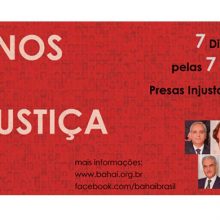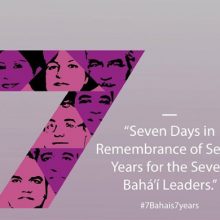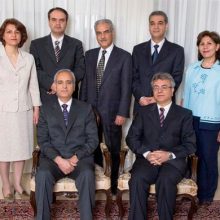Source: en.iranwire.com
The Baha’i International Community (BIC) today launches a global campaign to raise awareness about the situation for Baha’is in Iran, and to commemorate the seventh anniversary of the unlawful arrest and imprisonment of seven prominent Baha’i leaders.
The campaign, which runs from May 14 to May 20, calls for the immediate release of Mahvash Sabet, Fariba Kamalabadi,Jamaloddin Khanjani, Afif Naeimi, Saeid Rezaie, Behrouz Tavakkoli and Vahid Tizfahm, who were all arrested in early 2008 for being leading members of an Iranian Baha’i community group.
Each day of the campaign will focus on one of the seven detainees, highlighting the details of their cases and calling for international support via social media, and in particular through BIC’s Facebook Event page. To raise awareness of the campaign, IranWire will be running a series of interviews with family members of some of the seven prisoners.
All seven continue to endure inhumane conditions in two of Iran’s most notorious prisons – the two female leaders,Mahvash Sabet and Fariba Kamalabadi are currently held in Evin Prison, and the five male leaders are imprisoned at Karaj’s Gohardasht Prison.
The campaign has already attracted significant support from around the world, both from ordinary citizens posting supportive messages online and from various Baha’i communities. Australian and Austrian Baha’i community groups both posted messages on the Facebook campaign page, and the New Zealand Baha’i community dedicated a song to the prisoners.
People are being encouraged to show their solidarity using the hashtag #7bahais7years. There is also a Facebook campaign page in Persian.
As group secretary for the Baha’i community, Mahvash Sabet was the first to be arrested on March 5, 2008; the other six Baha’i leaders were detained on May 14, 2008.
But it was not until three years later, in March 2011, that the seven Baha’i leaders were put on trial. After just six days in court, with the authorities repeatedly attempting to bar the defendants’ lawyers from entering the courtroom, they were sentenced to 20 years in prison — the longest ever sentence for a prisoner of conscience in Iran. They were charged with “espionage for Israel,” “insulting religious sanctities,” “propaganda against the system,” and “corruption on earth.”
Whilst awaiting trial, it was reported that the seven leaders were held in poor conditions, with only limited access to their families. Additionally, during the first few months of their detention, Kamalabadi and Sabet were held in solitary confinement, while Khanjani was not allowed to go to his wife’s funeral when she died in March 2011.
Prior to 2008, three of the seven leaders had already been arrested for Baha’i activities.
As well as accusing the Baha’is and other groups of espionage and propaganda, Iranian authorities have also repeatedly linked the faith with protest movements, including the Green Movement protests during and after the disputed presidential election in 2009.
The Baha’i faith was founded in Iran in 1844 by an Iranian called Bahá’u’lláh and is today one of the world’s fastest growing religions, with more than five million followers; it is founded on the principle that humanity is made up of one single race and that the world should therefore be united in one global society.
Despite the peaceful nature of the Baha’i community, its people have faced constant persecution from the Iranian authorities, from public humiliation in the 19th century to the brutality of the late 1990s-early 2000s that saw hundreds of Baha’is imprisoned, tortured and executed. In recent years, and particularly since the Green Movement in 2009, Baha’i teachers and followers have continued to be arrested. Anti-Baha’i propaganda on Iran’s state television depicts them as a cult and a threat to Islamic society.
Unlike other minority religions like Judaism, Zoroastrianism and Christianity, the Iranian constitution does not recognise the Baha’i faith, instead designating it as a “heretical sect.”. This means, among other things, they are banned from holding religious ceremonies or gatherings, as well as being denied basic rights, including the right to a proper burial and access to higher education. Baha’i students and teachers are forbidden from attending or teaching at regular universities in Iran. Authorities routinely block Bahai’s from advancing their careers, and they are banned from some types of employment, including government jobs.
This has resulted in the rise of hate violence towards the Baha’is, including hate speech, anti-Baha’i graffiti, desecration of Baha’i cemeteries and arson attacks.
To counter the Iranian government’s ban on Baha’is receiving higher education, the Baha’i community set up the Baha’i Institute for Higher Education (BIHE) in 1987, an underground university where classes are held in secret at peoples’ homes, and with the threat of arrest a part of daily life.
According to the official BIHE website, which is now recognized by academic institutions around the globe, it offers Iranian Baha’is a choice of more than 1,050 courses ranging from Persian Literature to Applied Chemistry, and accepts an average of about 450 students every year. Much like other students in Iran, BIHE applicants must meet rigorous academic requirements and pass a national entrance exam to be accepted.
Despite the government’s actions, the right to freedom of religion and freedom of education are both recognized under international human rights treaties, including the Universal Declaration of Human Rights, of which Iran is a signatory. The Islamic authorities are violating these treaties by denying the Baha’is’ their rights.
UN Secretary General Ban Ki Moon and UN High Commissioner for Iran, Ahmed Shaheed, have repeatedly expressed their concerns about Iran’s infringement of these basic human rights, both for the Baha’is specifically and for other ethnic and religious minorities in Iran.
“The situation of religious tolerance is very poor in the country,” said Dr Shaheed in a recent interview with Iranwire. “And this includes the continued persecution and incitement against the Baha’is.
Dr. Ahmed Shaheed presented his fourth and latest report to the United Nations’ 28th session of the Human Rights Council (UNHRC) in March this year. According to this report, which identifies shortcomings in the justice system, such as inefficient due process and abuse of solitary confinement, as contributing to continuing human rights abuses in Iran, a minimum of 100 Baha’is and 92 Christians are in jail on faulty or trumped-up charges.
It was exactly two years ago, in May 2013, that BIC organized a similar 10-day-long campaign called “Five Years Too Many” to demand the release of the seven Baha’i leaders. This resulted in widespread statements calling for their release, including from government officials, religious leaders, human rights activists and ordinary citizens, as well as Baha’i communities and other groups planning public events to shed light on the issue.
This year’s campaign offers another opportunity to draw attention to the unlawful imprisonment of these seven individuals, and hopefully their eventual release. The Baha’i leaders have done nothing except exercise their basic human right to freedom of religion. It is crucial that activists, journalists and the public continue to raise awareness of their situation and to make it clear to the Islamic authorities that the world will not stand for the continued targeting and persecution of the Baha’is, or for any other religious or ethnic minority.




May 15, 2015 6:53 am
As a writer and as a teacher like Mahvash and above all as a fellow believer I find her plight so sad that I’m committed to trying any and all approaches that might help.
This time last year while attending in Tehran the first national congress of Esperanto I was pleasantly surprised (scared and suspicious too given that I’m a published Baha’i Esperantist author) to see the high regard in which the Iranian authorities hold the local and the international Esperanto movement. Can the Baha’is at an institutional level reach out to the Esperantists’ national and international administrations, in the same way as Baha’is reach out to the UN and the English speaking media, and ask the Esperantists to act as neutral intermediaries? Just a thought worth consulting on given the sufferings of our coreligionists.
This sort of humanitarian action is exactly what gave the Esperanto movement such a fine reputation in WW1 and WW2.
A record number of Iranian Esperantists (30) are registered to attend the 100th World Congress of Esperanto at the end of July in France where 3,000 speakers of Esperanto from 70 countries will gather in an effort to promote world peace.
The second Iranian Congress of Esperanto is slated to occur about a month later in Tehran.
I’ll be praying today with millions of other Baha’is.
Baha’i love.
Paul